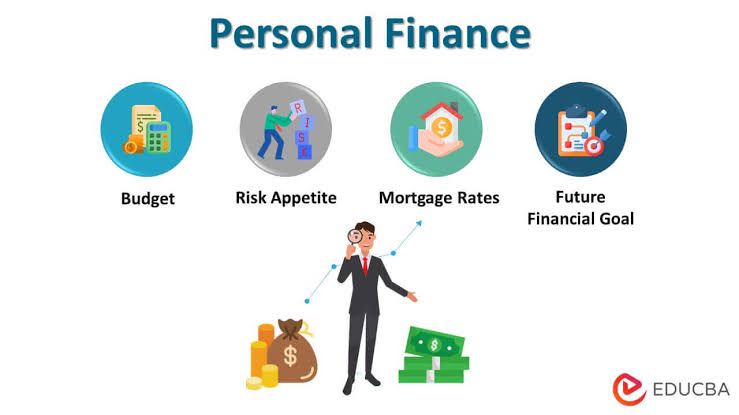Table of Contents
Personal finance is a term that encompasses everything related to managing your money, including budgeting, saving, investing, and planning for retirement. In today’s rapidly changing economic landscape, having a solid grasp of personal finance is more important than ever. Whether you are just starting your career or looking to secure your future, learning how to manage your finances effectively can help you build wealth, avoid debt, and achieve financial independence.

In this article, we will explore the essential components of personal finance and provide actionable tips to help you take control of your financial life
1. Budgeting: The Foundation of Financial Health
Budgeting is the cornerstone of personal finance. It involves tracking your income and expenses to ensure you are living within your means. A well-structured budget helps you allocate money towards necessary expenses, savings, and discretionary spending.
Steps to Create a Budget:
- List Your Income Sources: Identify all sources of income, including your salary, side hustles, and any passive income streams.
- Track Your Expenses: Divide your expenses into categories such as housing, utilities, groceries, transportation, and entertainment. Use tools like spreadsheets or budgeting apps to make this easier.
- Set Financial Goals: Whether you want to save for a vacation or pay off debt, having clear goals will motivate you to stick to your budget.
- Adjust as Needed: Life circumstances change, and so should your budget. Review it monthly and make necessary adjustments.
Recommended Budgeting Tools:
Mint, YNAB (You Need A Budget), and EveryDollar are excellent apps for tracking and managing your budget effectively.
2. Saving: Building an Emergency Fund
An emergency fund is a financial safety net that covers unexpected expenses such as medical emergencies, car repairs, or job loss. Experts recommend saving three to six months’ worth of living expenses in an easily accessible account.
How to Build an Emergency Fund:
- Set a Savings Goal: Calculate how much you would need to cover basic expenses for three to six months.
- Automate Your Savings: Set up an automatic transfer to a separate savings account each month.
- Cut Unnecessary Expenses: If you’re struggling to save, look for areas in your budget where you can cut back, like dining out or subscription services.
3. Investing: Growing Your Wealth Over Time
Investing is a key part of building long-term wealth. The earlier you start investing, the more time your money has to grow due to compound interest. There are several types of investments, including stocks, bonds, mutual funds, and real estate.
Investment Tips for Beginners:
- Diversify Your Portfolio: Spread your investments across different asset classes to minimize risk.
- Understand Your Risk Tolerance: Determine how much risk you are willing to take based on your financial goals and timeline.
- Use Tax-Advantaged Accounts: Contribute to retirement accounts like a 401(k) or IRA, which offer tax benefits.
Popular Investment Platforms:
Robinhood, Vanguard, and Fidelity are user-friendly platforms for beginners to start investing.
4. Managing Debt: How to Get Out of the Red
Debt can be a significant barrier to financial freedom. Whether it’s credit card debt, student loans, or a mortgage, it’s essential to have a strategy for paying it off.
Debt Repayment Strategies:
- The Debt Snowball Method: Focus on paying off the smallest debt first while making minimum payments on the others. Once the smallest debt is paid off, move to the next one.
- The Debt Avalanche Method: Pay off the debt with the highest interest rate first to save money on interest over time.
- Consolidation and Refinancing: Consider consolidating your debts into one loan with a lower interest rate, or refinancing your loans to reduce monthly payments.
5. Retirement Planning: Securing Your Financial Future
Planning for retirement should be a top financial priority, regardless of your age. The earlier you start, the more comfortable your retirement years will be.
Retirement Planning Tips:
- Start Early: Thanks to compound interest, even small contributions made early in your career can grow significantly over time.
- Maximize Employer Contributions: If your employer offers a 401(k) match, contribute at least enough to take full advantage of it.
- Diversify Retirement Accounts: In addition to a 401(k), consider opening an IRA (Individual Retirement Account) for more investment flexibility.
Insurance: Protecting Your Assets
Insurance is an often overlooked but critical component of personal finance. It helps protect your assets and provides financial security in case of unexpected events.
Types of Insurance to Consider:
- Health Insurance: Covers medical expenses and protects against high healthcare costs.
- Life Insurance: Provides financial support
- Homeowner’s or Renter’s Insurance: Protects your home or personal property in case of damage or theft.
- Disability Insurance: Replaces a portion of your income if you are unable to work due to illness or injury.
Conclusion
Personal finance may seem overwhelming, but by following the principles of budgeting, saving, investing, and planning for the future, you can build a secure financial foundation. Start with small, manageable steps and gradually work towards achieving your financial goals. Remember, the key to success in personal finance is consistency and making informed decisions about your money.
By prioritizing financial education and taking control of your personal finances, you can create a brighter, more financially secure future.
